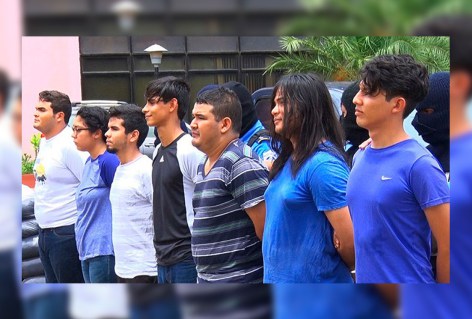3 de septiembre 2018

Children of Exile: The Births “Sowing Hope” in the Camp of Nicaraguan Farmers

PUBLICIDAD 1M
PUBLICIDAD 4D
PUBLICIDAD 5D
“Your lost, sad gazes block the air to my lungs and slice my soul in two.”

Before doing anything else, I want us to hold onto these names: Levy Rugama, Yaritza Mairena, Victoria Obando, Byron Corea, Juan Alvarado, Nahiroby Olivas and Luis Quiroz. Young students who haven’t even reached the middle of their lives and who have become the direct victims of the Ortega dictatorship. Justice, honor and respect to all of them. We’re not worthy of such sacrifice.
I’m writing this with immense sorrow in my heart, from a distance and an emotional place beyond consolation. The grief has grown larger, uncontrollable, and today I can’t go on: I must let it out.
Yaritza, Victoria, Levy, Luis, Byron, Nahiroby and Juan were abducted on Saturday, August 25, while participating in a citizens’ demonstration in Leon. They’re young people who since April 18th have become activist student leaders, fighting for the freedom of Nicaragua. Our Nicaragua. Today the genocidal state presents them as terrorists.
Their lost, sad gazes, block the air to my lungs and slice my soul in two. The seven are students, not terrorists. They’re kids who up until five months ago were completely dedicated to their studies and to living out their youth. They’re noble people, who’ve been put where they are through the course of events. They don’t deserve any of what they’re living through.
I met Yaritza and Victoria in May, during the occupation of Managua’s National Autonomous University (UNAN). I’d previously agreed that Yaritza would be my guide to the university, and I met Victoria while looking for clean pants for a girl who’d gotten her period and stained her clothes. She decided to go with us, and together we went through most of the doors in the university hall. From my experiences, I can affirm how wonderful they both are.
Yaritza has a serious and firm gaze. She’s really an incredible human being. When you get to know her better, she jokes, but she’s also very eloquent. She told me that when everything was over, the only thing she wanted was to get her diploma and rest. She was traumatized by the gunshots that we heard every night, and she admitted that she felt a little shy about appearing in the media. We talked about feminism and how difficult it was to struggle for our own spaces, even in the insurrection. We agreed on so much in such a short time, and from then on my admiration for her became enormous.
Victoria is more smiling and opens up more easily. She tried to answer all my doubts about the UNAN, and if she didn’t know something, she’d run to the closest person to help me better. She told me many funny stories about things that happened in the university. The pride she felt to be part of the LGBTQ community and the “incredible nerve” of people who didn’t call her by her name, Victoria. I recall that she challenged me: When was I going to report on the participation of “the queers” in the struggle? I promised her that even if I couldn’t assure it would be soon, I did want to do it. I’d interview her. A month later, I had to quit my job, and I didn’t keep that promise.
For their part, the rest of the young people admired them from a distance. These young women weren’t afraid to show their faces, even though they knew the consequences this would bring. They weren’t afraid. I admire them. I can’t imagine everything that they’ve done to them inside those torture chambers. I don’t want to think about the misogynist tortures directed at Yaritza and Victoria. There’s not enough air in my chest to describe the pain I have in my soul. These youth are the loyal representatives of our people’s spirit. We haven’t lived up to their example.
If there’s one promise I’d want to keep for Victoria, it’s that she’ll get out of where she is now. She’ll get out to become an incredible woman, as she already was. She’ll get out to defend the rights of the LGBTQ community. She’ll get out to enjoy the new Nicaragua, because people like her are the ones who deserve it most.
PUBLICIDAD 3M
PUBLICIDAD 3D